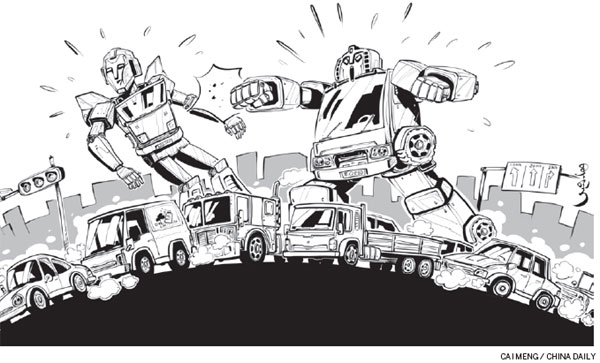Traffic law enforcement best protection for lives
Updated: 2015-05-08 07:43
By Li Yang(China Daily)
|
||||||||

The dramatic fight between two drivers in Chengdu, Sichuan province, early this week has sparked a heated debate on how to deal with rash driving. The incident started with a woman driving a red car abruptly changed three lanes to exit an expressway. Caught unawares by the sudden change, a man driving a black car in the middle lane instinctively slammed the brakes to avoid a crash. Angry with the red car's driver, he accelerated and chased it out of the expressway.
At this point, both drivers lost their senses, ignoring public security and violating traffic rules. The man ultimately forced the woman to stop her car, and immediately started raining blows on her. She ended up with a broken shoulder bone, a light cerebral concussion and bruises all over the body.
The man also wounded a taxi driver with a screwdriver for trying to stop him from beating up the woman before being subdued by police, who detained him for suspected violation of criminal law.
Although two days later traffic police issued a ticket to and fined the woman 100 yuan ($16) and deducted 3 points from her driving license, she said from her hospital bed that there was nothing wrong with her driving, and that she had been driving that way for five years. Incidentally, if 12 points are deducted in a year, a person loses his/her license.
Both drivers were at fault, the only difference being their gender and strength. And both are big threats to public safety. But many people say the man was right because the woman had to be taught a lesson - only he should not have thrashed her so hard.
A road is like a society that runs on laws. And if law-enforcement officers fail their duties, the road will turn into a jungle where might will be right. It may not be possible to implement all the relevant traffic laws on the spot, but it is possible to revise them and seriously increase the punishment for rash and dangerous driving. For example, the fine for violating traffic rules can be calculated according to a driver's wealth or the price of the car he/she is driving, and drivers like the Chengdu duo should be permanently banned from driving for being totally indifferent to other people's lives.
Training programs in most driving schools are exam-oriented, because they can attract more customers by promising to get them driving licenses faster rather than teaching them how to become good drivers. No wonder, many new drivers are adept at parking their cars even in narrow space, a compulsory test but cannot cope with emergency cases on the road.
The number of vehicles on China's roads has increased tenfold in the past decade, and the number of drivers has risen more than 30 times. And every year, traffic accidents claim 2.22 lives out of 10,000 vehicles.
The authorities should strengthen regulations for driving schools to make drivers more aware of people's safety from the day they start their first driving lesson.
The media, too, has a vital role to play: they should not celebrate fast and furious driving, which some movies and
TV series have made a recipe for box office success. Safety should be the priority of all drivers and maintaining road order the duty of everyone using the roads.
In China, where roads and expressways and other traffic infrastructure are mostly vehicle-centered, there is an urgent need to educate people, drivers in particular, that automobiles can never be more valuable than the lives of pedestrians and cyclists, and that driving a car, no matter how expensive, means shouldering more responsibilities.
The author is a writer with China Daily. liyang@chinadaily.com.cn
- Global health entering new era: WHO chief
- Brazil's planning minister steps aside after recordings revelation
- Vietnam, US adopt joint statement on advancing comprehensive partnership
- European border closures 'inhumane': UN refugee agency
- Japan's foreign minister calls A-bombings extremely regrettable
- Fukushima impact unprecedented for oceans: US expert

 Stars of Lijiang River: Elderly brothers with white beards
Stars of Lijiang River: Elderly brothers with white beards
 Wealthy Chinese children paying money to learn British manners
Wealthy Chinese children paying money to learn British manners
 Military-style wedding: Fighter jets, grooms in dashing uniforms
Military-style wedding: Fighter jets, grooms in dashing uniforms
 Striking photos around the world: May 16 - May 22
Striking photos around the world: May 16 - May 22
 Robots help elderly in nursing home in east China
Robots help elderly in nursing home in east China
 Hanging in the air: Chongqing holds rescue drill
Hanging in the air: Chongqing holds rescue drill
 2.1-ton tofu finishes in two hours in central China
2.1-ton tofu finishes in two hours in central China
 Six things you may not know about Grain Buds
Six things you may not know about Grain Buds
Most Viewed
Editor's Picks

|

|

|

|

|

|
Today's Top News
Liang avoids jail in shooting death
China's finance minister addresses ratings downgrade
Duke alumni visit Chinese Embassy
Marriott unlikely to top Anbang offer for Starwood: Observers
Chinese biopharma debuts on Nasdaq
What ends Jeb Bush's White House hopes
Investigation for Nicolas's campaign
Will US-ASEAN meeting be good for region?
US Weekly

|

|







